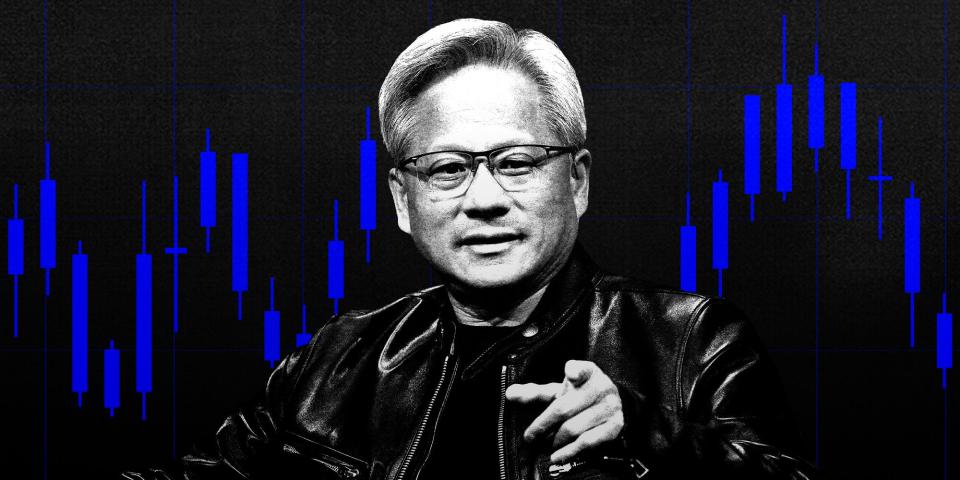Nvidia’s stock fell 5% despite a strong second quarter, which Wall Street sees as a buying opportunity.
Third-quarter revenue guidance of $32.5 billion beat average estimates but missed higher forecasts.
Analysts highlight Nvidia’s long-term AI-chip potential and demand for Hopper and Blackwell chips.
Nvidia’s stock-price decline on Thursday represents a buy-the-dip opportunity for investors, according to a chorus of Wall Street analysts and portfolio managers.
Nvidia shares declined as much as 5% after it reported strong second-quarter earnings results, signaling that investor expectations were too high.
Third-quarter revenue guidance was $32.5 billion, which was ahead of average analyst estimates of $31.9 billion but well below some sky-high forecasts of nearly $38 billion.
Still, analysts say Nvidia’s results reinforced the idea that the company still has a long runway to ship hundreds of billions of dollars’ worth of AI-enabled graphics processing units over the next few years.
Here’s what Wall Street is saying about Nvidia’s earnings results.
Bank of America: Ignore quarterly noise
Vivek Arya, a Bank of America analyst, reiterated his “buy” rating on Nvidia, called it a “top sector pick,” and raised his price target to $165 from $150, representing an upside of 36%.
While Arya acknowledged that Nvidia’s couple-of-months delay of its next-generation Blackwell chip could lead to a “good not great” third quarter, he said its prospects were too strong to ignore.
“We continue to believe in NVDA’s unique growth opportunity, execution and dominant 80%+ share as generative AI deployments are still in their first 1 – 1.5yr of what is at least a 3 – 4 year upfront investment cycle,” Arya said.
He added: “Importantly, next-gen AI models will require 10x-20x more compute power to train (Blackwell only 3x – 4x more compute over Hopper).”
And that should mean demand for Nvidia’s chips won’t decline when it introduces its next-next-generation GPU chip, Rubin, which is expected to be released in 2026.
Finally, Arya said Nvidia offered investors a “compelling valuation” at a 30-times to 35-times price-to-earnings ratio based on 2025 estimates, with earnings per share expected to grow 40%.
JPMorgan: Blackwell-chip delay won’t affect 2025 revenue
JPMorgan said the expected two-month delay in Nvidia’s Blackwell-chip rollout wouldn’t negatively influence the company’s expected revenue profile in 2024 and 2025.
“Demand for Blackwell is very strong and will outstrip supply at least through the middle of CY25, in our view,” Harlan Sur, a JPMorgan analyst, said.
The surprisingly strong demand for Nvidia’s previous-generation Hopper chip is helping fill the revenue gap left by Blackwell and has upside potential “given the strong AI demand environment,” Sur said.
“Bottom line, the team continues to maintain a 1- 2 step lead ahead of competitors with its silicon/hardware/software platforms, and a strong ecosystem and the team is further distancing itself with its aggressive cadence of new product launches and more product segmentation over time,” Sur added.
JPMorgan reiterated its “overweight” rating and increased its price target to $155 from $115, representing an upside of 27%.
Goldman Sachs: Nvidia offers balanced risk-reward profile
Toshiya Hari, a Goldman Sachs analyst, was encouraged by Nvidia’s expected Blackwell product ramp in the fourth quarter, the continued strength of Hopper, and a doubling of revenue in Nvidia’s Networking business.
The analyst said in the most bullish scenario, Nvidia shares could soar 89% to $230 a share if the company could deliver a year-over-year growth rate of 100% for its Data Center business next year.
Hari’s most bearish scenario includes a 60% stock-price move to $47 based on a 25% year-over-year decline in Nvidia’s Data Center revenue from major cloud players.
And, ultimately, a 90% upside scenario versus a 60% downside scenario represents an attractive risk-reward profile for investors.
Wall Street portfolio managers
Wall Street professionals who manage money for clients are viewing Nvidia’s stock-price decline as an opportunity to buy more shares.
In emails to Business Insider, here’s what they had to say:
Nancy Tengler, CEO and chief investment officer of Laffer Tengler Investments
“We think the sell-off is an opportunity to accumulate the stock. This is not the internet bubble. Old economy companies are embracing AI to improve margins and the hyperscalers are still scaling to the tune of about $50MM each + around 79% yoy,” Tengler said.
John Belton, portfolio manager at Gabelli Funds
“This was a solid ‘thesis validation’ quarter. Everything for the most part is on track. Earnings expectations are moving higher. As long-term investors, we are not going to be bothered by the idea that beating expectations is somehow boring. That said, the thought of Nvidia becoming boring would probably be a healthy thing for the stock and for the stock market more broadly,” Belton said.
James Demmert, chief investment officer of Main Street Research
“The pullback in Nvidia’s stock is an invitation for investors to buy the stock,” Demmert said. “Especially for investors who missed the even bigger buying opportunity with Nvidia that came about in early August.”
He added: “The strength in Nvidia’s quarter showed that its valuation is justified and that the stock has more room to run.”
Read the original article on Business Insider
Credit: Source link




